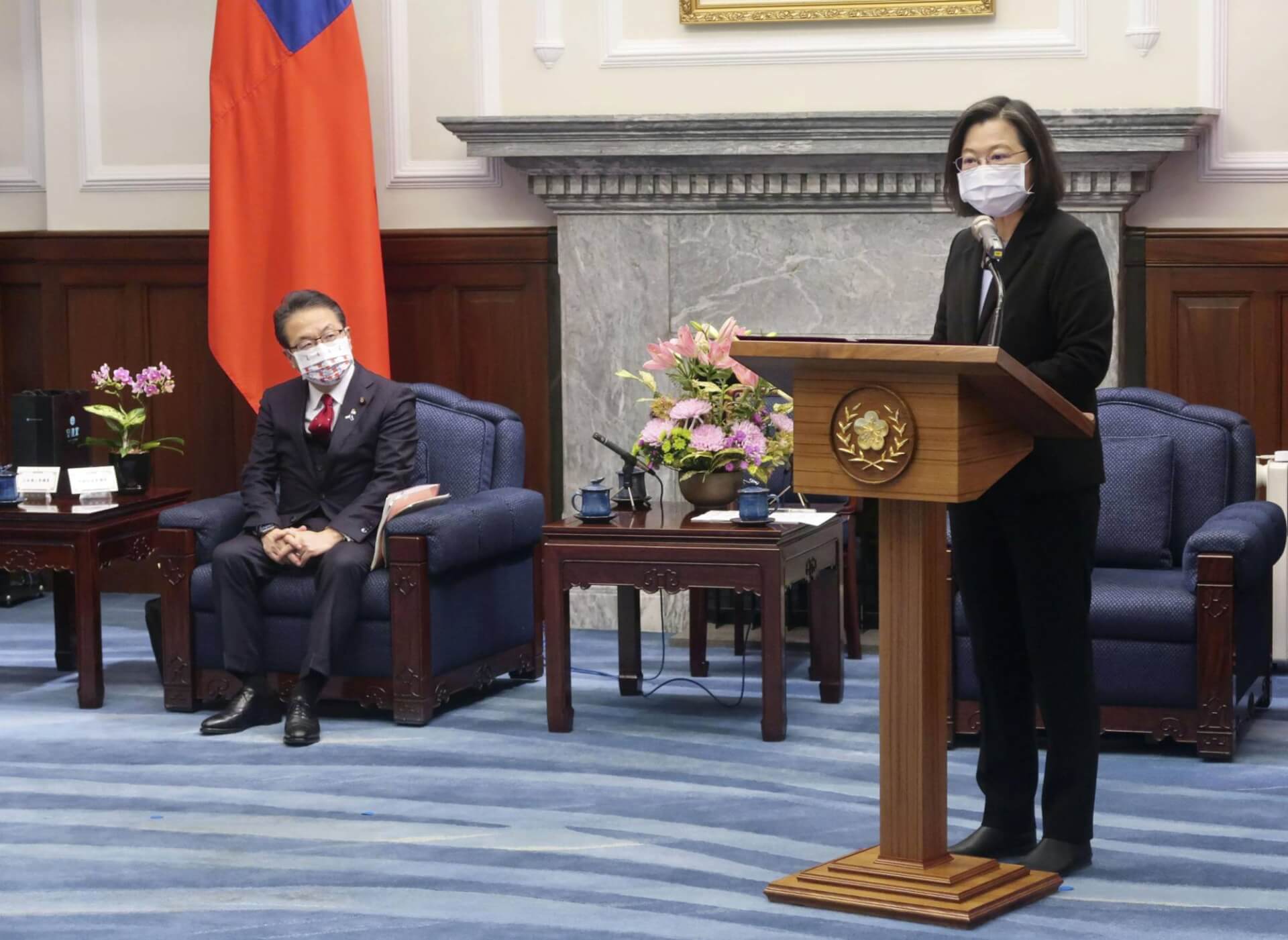Taiwanese President Tsai Ing-wen on Wednesday lauded Japan’s new national security strategy that allows for unprecedented military build-up and aims to foster regional security against the backdrop of growing threats from China.
During a meeting with Hiroshige Seko, the upper house secretary-general of Japan’s ruling Liberal Democratic Party (LDP), Tsai said Tokyo's “resolve to maintain regional peace and stability” is reflected through this move to bolster its defences.
Alluding to her administration’s plans to do the same, Tsai said in a tweet that the island was “determined to strengthen its defence capabilities.” She further called on Japan to “strengthen cooperation toward the realisation of a free and open Indo-Pacific.”
Meanwhile, Seko told Tsai that as a close security partner of the United States (US), Japan’s updated security policy “will work as a clear and strong deterrent” against attempts to “change the status quo by force.”
He added that the US National Defence Authorisation Act (NDAA) for the fiscal year 2023 would help the self-governing island further deter China. The NDAA stipulates that Washington will give Taiwan $10 billion in security assistance, fast-tracked weapons procurement, $2 billion as military loans over the next five years, and increase arms sales to the island.
世耕弘成参議院自民党幹事長と参議院議員の皆様、ようこそ台湾へ。経済・貿易等の分野で常々台湾を強く支持してくださり、ありがとうございます。台湾は強い決意をもって防衛力強化に努めています。自由で開かれたインド太平洋の実現へ向けて、ぜひ連携を強めていきましょう。 pic.twitter.com/HVi1cwSZHa
— 蔡英文 Tsai Ing-wen (@iingwen) December 28, 2022
Additionally, both diplomats agreed to strengthen their push for Taiwan’s bid to join the Comprehensive and Progressive Agreement for Trans-Pacific Partnership (CPTPP), an 11-member free trade agreement (FTA), the Japanese lawmaker told the media after their meeting.
Tsai’s comments came after Japan announced its biggest military buildup in decades on 16 December, including doubling its defence expenditure, firmly signalling that it is moving away from its pacifist constitution.
The national security strategy document asserted that Japan must adapt to “historical changes in power balances, particularly in the Indo-Pacific region,” where it said the security environment is “as severe and complex as it has ever been since the end of World War II.”
In particular, the document pointed to the Chinese People's Liberation Army (PLA) pledging to promptly elevate itself to “world-class standards,” because of which Beijing has been “increasing its defence expenditures at a continuously high level and extensively and rapidly enhancing its military power, including its nuclear and missile capabilities, without sufficient transparency.”
The Taiwan question is China’s internal affair and brooks no interference from any external forces. On the Taiwan question, Japan in particular needs to be prudent, honor its commitments and make sure it does not send any wrong signal. pic.twitter.com/PTT4l8SVzK
— Spokesperson发言人办公室 (@MFA_China) December 19, 2022
The defence ministry accused China of intensifying its “attempts to unilaterally change the status quo by force in the maritime and air domains including in the East and South China Seas.”
Accordingly, it said Japan “must protect its own national interests,” by “steadfastly preparing for the worst-case scenario, including fundamental reinforcement of its defence capabilities.”
In this regard, the defence ministry announced that over the next five years, Japan’s defence budget will constitute 2% of the country’s GDP. Further, it will bolster its responses in coordination with “like-minded countries.” The new budget amounts to around 43 trillion yen ($320 billion), approximately 1.6 times that of the current five-year total.
Japan is also looking to expand the range of its Type 12 surface-to-ship guided missile from just over 100 kilometres to about 1,000 kilometres. This would allow the missile to reach places like North Korea and coastal China.
Similarly, Taiwan faces a severe threat from China, which usually increases the number of fighter jets it sends into Taiwanese airspace in retaliation against events that it deems provocative.
For instance, after US House Speaker Nancy Pelosi’s visit to Taipei in early August, the PLA stepped up its incursions into Taiwanese territory to an unprecedented level, sending warships, missiles, and fighter jets into Taiwanese waters and skies. To this end, Taiwan has been rapidly expanding its defence budget to counter a possible future invasion by China.
In August, Taiwan proposed an initiative to allocate a record T$586.3 billion ($19.41 billion) to its defence budget for next year, a 13.9% year-on-year increase. Additionally, it is in the process of procuring more Stinger missiles from the US to strengthen its air defence capability.

